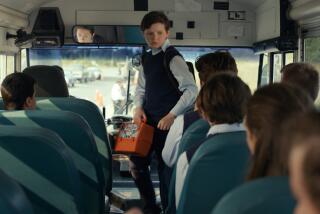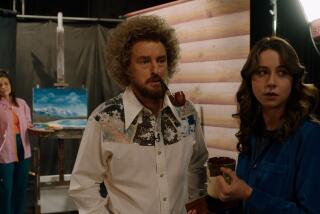Review: Need a Chris O’Dowd fix? Drop by ‘Moone Boy’
Like it were planned, and perhaps it was, American fans of Chris O’Dowd left bereft by the end of Christopher Guest’s HBO series “Family Tree” may jump, as from a lovely frying pan into a really nice fire, to O’Dowd’s own “Moone Boy,” which begins streaming Wednesday on Hulu.
As it happens — and not surprisingly, given that the improvisatory “Family Tree” made much use of O’Dowd’s own voice — the two series have a lot in common. Both are sweet and a little eccentric, interested in small things and informed by the creator-star’s seeming good nature, though perhaps that is just the soft music of the accent. (I think perhaps you should read this whole review in that accent.) He may be a raging tyrant offstage, for all I know, but “Moone Boy” does not seem to me the sort of series a raging tyrant would bother, were he at all able, to make.
It begins: “Ever wanted to be the imaginary friend of an idiot boy in the West of Ireland? Me neither, but there you go.”
The speaker is Seán Murphy (O’Dowd), imaginary friend; Martin Moone (a marvelous David Rawle), the so-called idiot boy, is the youngest and only male child of four. They live together, on their intersecting planes, in the small country town of Boyle, County Roscommon, which is O’Dowd’s hometown as well. The year is 1989, a time of change, for our hero and his people, but as old-fashioned as Mayberry from the super-connected aspect of now.
“Hello, Mr. Farmer! Hello, Mr. Farmer’s dog,” cries Martin as he rides by on his cereal coupon-bought birthday bike, soon to be dismantled by twin bullies. (His father, played by Peter McDonald, having armed himself with a small hammer, will pay a visit to the bullies’ father, who will invite him in for a “quick cuppa tea — did I say tea? I meant gin.” It is that sort of series.)
He is a dreamy youth, a little slow, but also a little clever. We meet him trying to revive a dead bird (“You’ll be back on your feet in no time, Mrs. Magpie”); failing that, he draws its picture, which, as with other drawings throughout the show, springs to animated life. And Seán, within the limits of his invisibility, is unfailingly supportive:
“Mom says you were a mistake,” says a surly sister.
“Not a mistake!” Seán pipes up in support. “An accident!”
And later, after a sudden attack of puberty:
Martin: “Oh my God, what was that?”
Seán: “Maybe an allergy thing? Oh, had you eaten strawberries?”
The series has some of the youth-as-legend feel of American shows such as “Malcolm in the Middle” and “Everybody Hates Chris,” or the movie “A Christmas Story.” It’s the imaginary friend who narrates here and not the child — though, as Martin grows up to be, in a sense, O’Dowd, we may regard them nearly as one. (Seán has some independent agency, however — when a beloved uncle advises Martin to grow up, Seán heads off to shoot pool with some other rejected imaginary friends.)
Co-written by O’Dowd with Nick Vincent Murphy, it is a finely crafted little jewel of a show. Its humor is quiet — which is not to say polite or conventional — but nearly every laugh line delivers. You want to turn the dialogue over in your hand in appreciation. It leaves you feeling happy, without ever trying to make you “feel good.”
There are only six episodes in the season; the trick will be not to watch them all at once. Then again, second and third series are already underway — so, all right, go ahead.
PHOTOS, VIDEOS & MORE:
Real places, fake characters: TV’s bars and eateries
CRITICS’ PICKS: What to watch, where to go, what to eat
PHOTOS: Violence in TV shows
More to Read
The complete guide to home viewing
Get Screen Gab for everything about the TV shows and streaming movies everyone’s talking about.
You may occasionally receive promotional content from the Los Angeles Times.







